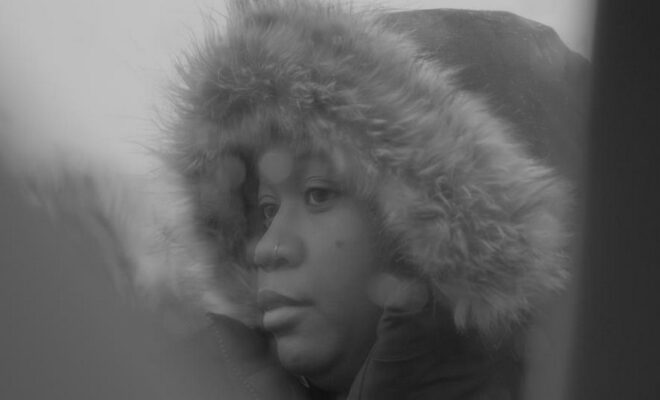 Courtesy of Exodus
Courtesy of Exodus
Interviews
Nimco Sheikhaden – Exodus
By: Malasha Parker
Q) What moved you to make a documentary about life after incarceration for these women?
A) I’ve always been interested in what happens in the in-between, the space between freedom on paper and freedom in practice. We talk about sentencing and even prison conditions, but what happens after release is just as defining. Trinity [Copeland] and Assia’s [Serrano] journeys expose the tension between what freedom is supposed to mean and what it actually looks like. Their stories reveal the emotional weight of rebuilding relationships, navigating systems that are set up to fail them and finding a sense of self after years of being defined by the worst thing they’ve ever done. Like so many others, I also have a close loved one on the inside and I wanted to examine what life might look like for him post release. I’m so honored to have been entrusted to tell the stories of Trinity and Assia and their close loved ones and we’re all so incredibly proud of this film.
Q) When you heard their stories, how did it make you feel?
A) It made me feel a complex mix of emotions – anger at the barriers they face, admiration for their resilience and a deep responsibility to get it right. There’s so much strength in the way they move through the world despite everything they’ve endured. More than anything, their journeys felt emblematic of so many others, a reflection of lives too often overlooked. I hoped the film could serve as a window into an experience that remains distant for many, bridging the gap between perception and reality.
Q) What made telling these stories difficult and what was easy to show?
A) The hardest part was doing justice to the depth of their experiences. Reentry isn’t just about checking off a list of obstacles, it’s about identity, relationships and navigating a world that often refuses to see you beyond your past. The easiest part, in a way, was showing their humanity. They are warm, funny, complicated and full of life. That came through naturally.
Q) Was it difficult to find the right people for this project?
A) It wasn’t really hard finding people. We came across Sara Bennett’s photography series and reached out, and she was incredibly open to connecting us and supporting the film. Sara had a longstanding relationship with both women and they were really open to the process. Trinity was searching for a space where she could finally be seen and heard after spending over a decade invisible to society, so she was eager to share her story. Assia, having been deported, was fighting to return home and reunite with her family. She had no choice but to become her own fiercest advocate and the film became a platform for her voice. From that point forward our focus was on building trust. A lot of women coming home have been misrepresented or exploited by the media, so I knew I had to move at their pace and let them decide what they wanted to share. My own personal connection to the issue helped, but ultimately, it was about being present, listening and letting the film take shape in a way that honored their truth.
Q) Neither of the women go into deep details about what they were incarcerated for. Was it a conscious choice not to dig too deep into those details? If so, why is that?
A) Absolutely. We made a conscious choice to reject the typical framing. The system already defines people by their worst moments. I wasn’t interested in reinforcing that. Trinity and Assia have lived full lives before, during and after prison. Their past is part of their story, but it’s not the whole story. The film focuses on who they are now and where they’re going, rather than reducing them to a single act. The truth is, freedom is about more than just release. It’s about the right to exist beyond a single narrative, to define yourself on your own terms. We wanted to tell this story without forcing Trinity and Assia to perform their pain or justify their right to move forward. The film isn’t about proving worthiness. It’s about making space for these women to be seen as they are: flawed, resilient, hopeful and human.
The focus of Exodus was always on who they are now and where they’re going, not just what they’ve survived. By shifting the lens away from the crime itself, we’re asking the audience to engage with them as whole people, to see their struggles, triumphs and the profound challenges of reentry without filtering everything through the question of guilt or innocence.
Q) How long did it take you to film Exodus?
A) We spent a few months developing the idea of the film and worked on connecting with the participants and their families and then filmed over the course of two years, following Trinity and Assia as they adjusted to life outside. Reentry isn’t a neat process, it’s ongoing and we really wanted to give the story the time it needed to unfold naturally.
Q) After filming this, how did the women feel about their stories and the reactions?
A) Thankfully, we intentionally involved both women at early and different stages of making the film so they had a sense of the process. Seeing yourself on screen, especially in such a vulnerable context, is always going to feel new and maybe even uncomfortable at times. But that’s why we spent so much time at the front end of this journey talking, sharing and preparing for how the process might unfold, so there weren’t any surprises.
Watching the film back with them was deeply emotional. They each had specific reflections that affirmed our efforts. Assia appreciated seeing her kids express the toll of her absence, something she had always felt but rarely witnessed so directly. Trinity got to hear her mother’s perspective in a way she hadn’t before which opened the door to certain conversations. She also relived the moment of her first day out which was helpful for her to reflect on how far she had come.
Like anyone seeing themselves on screen, there was some nervousness at first. But, ultimately, they embraced the film as a representation of their journey. They weren’t interested in telling a story that asked for pity. They wanted people to see the full reality of life after and the deeply human desire to be seen and to belong.
Q) What do you want the most important takeaway from Exodus to be?
A) That freedom isn’t just about walking out of a prison gate. It’s about being given the space to rebuild, to heal and to exist without constantly having to prove you deserve another chance.
Q) What did the discussions look like to get people to work on Exodus with you?
A) Most of the people who worked on this film weren’t just collaborators, they were mentors, close colleagues and friends, often all at once. That foundation of trust was essential because telling this story required more than just technical skill; it demanded a deep commitment to the people at its center. Everyone on our team was so thoughtful about how we wanted to approach the film. The conversations were about how we could make a film that felt honest and responsible, not just extractive. That meant centering the voices of those directly impacted, ensuring they had agency in how their stories were told and being deliberate about the narrative we were shaping. This team genuinely became like family and I’m incredibly grateful to have worked alongside them. The film is a reflection of their dedication, not just to the craft, but to the care and integrity this story required.
Q) How do you hope this film will affect the way people view those who have recently been freed from incarceration?
A) I hope it challenges people to rethink their assumptions. There’s an expectation that formerly incarcerated people have to prove their worthiness over and over again. But they are more than their past.
Q) In what ways would you like the film industry and various governments to move forward when discussing cases like Trinity and Assia’s in the future in order to make positive change?
A) I believe the film industry must make a more intentional investment in storytellers who have direct, lived experience with the issues they aim to highlight. There’s a level of privilege in this industry that often excludes those who come from marginalized backgrounds even though they might be best suited to tell these stories with the necessary nuance, empathy and care. Alongside that, we must resist the urge to rely on tired tropes and the temptation to sanitize stories for a hypothetical mainstream audience. I think there’s a deep hunger for complex, layered narratives that don’t offer easy, digestible conclusions but instead challenge audiences to engage with the messiness and difficulty of the issues at hand.
As for governments and those in a position of leadership, I think it’s important to stop setting people up to fail after release. Housing, employment and community support shouldn’t be impossible to access. The system claims to prioritize rehabilitation, but the reality is that it punishes people long after they’ve served their time. That has to change.
On a broader scale, as a society, we need to continually reckon with the existence of these systems that were built to warehouse people. We must think beyond punishment and envision alternatives that focus on repair and rebuilding. We cannot simply wait for elected officials to wake up and suddenly develop a conscience on these issues. We must demand accountability, putting sustained pressure on them to act and effect real change. The solution always begins with us.
Q) Are you currently working on any other projects?
A) Yes, I’m currently working on several projects that continue to explore themes of justice, survival and resilience. One of them is a short film executive produced by Shaka King, which follows a longtime educator in Bed-Stuy who retired after more than forty years, passing the torch to her daughter. That project should be coming out soon.
Beyond that, I’m developing a few narrative projects that I’m really excited about with two set to begin filming this summer. And, of course, we’re still actively supporting Exodus as it makes its way into the world, with some incredible festival screenings coming up. It’s been amazing to see how the film resonates with different audiences and we’re looking forward to continuing those conversations.
Covered at SXSW 2025





You must be logged in to post a comment Login